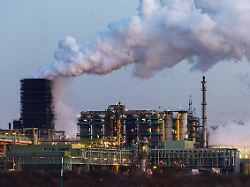Inflation falls, sentiment rises
The apocalypse fails
By Jan Ganger
01/17/2023, 2:05 p.m
Energy prices are skyrocketing, inflation is through the roof, fears of a wave of bankruptcies are growing: for a long time it looked as if Germany was facing an economic nightmare scenario. But it didn’t come to that.
The forecasts were bleak. The energy crisis triggered by the Russian invasion of Ukraine will cause a severe economic slump in Germany and even the destruction of entire industries, while inflation spirals out of control and homes remain cold, it said. A toxic cocktail of material shortages, disrupted supply chains, a lack of skilled workers and exorbitant energy prices could lead to a wave of bankruptcies. But the collapse did not happen.
Despite all the problems, the German economy grew by 1.9 percent last year. And this year, too, things are now looking much better than feared.
That’s not to say the warnings ahead of difficult months were unfounded. Gas and electricity prices went crazy at times in the summer. Inflation had shot up in Germany and is still extraordinarily high despite a significant decline.
But overall it currently looks like the peak has been passed. The energy crisis has been overcome – at least that is the current status. Gas, oil and electricity prices are back to pre-Russian levels. The German gas storage facilities are full to the brim. Even in the event of a severe cold spell, Germany would go into spring with well-stocked storage facilities. This means that the promised energy emergency has also become unlikely for the coming winter.
Chancellor Olaf Scholz is relieved. At the opening of a liquid gas terminal in Lubmin last weekend, he said: “We’ll get through this winter.” The fear of not making it was real.
Confidence increases
There are many reasons why the situation has largely eased. The mild winter weather is one of them. Another: Russia did not stop gas supplies to Germany abruptly, but gradually. This allowed Germany to prepare for a stop and look for alternatives.
Meanwhile, the costs for the electricity and gas brakes are melting together. The federal government has budgeted 200 billion – but only a fraction of that will probably be needed. And inflation also seems to have peaked. At times it was in the double digits and had shot up to 10.4 percent. It has now fallen to 8.6 percent. This is still very high, but the trend is clearly downwards.
When it comes to economic growth, too, optimism suddenly dominates. For months there has been talk of how deep the recession will be. But the mood has brightened. Goldman Sachs is at the forefront. The investment bank is assuming that the previously expected recession in the euro zone will fail and the economy will grow – at least by 0.6 percent. Inflation will have fallen to 3.2 percent by the end of the year, according to Goldman Sachs.
Industry now assumes that the German economy will shrink only slightly this year. The BDI association expects a minus of only 0.3 percent, i.e. a ‘red zero’,” said BDI President Siegfried Russwurm of the ARD. The economic forecasts of financial experts in Germany are also becoming more confident. The mood barometer determined by the ZEW research institute rose surprisingly in January into positive territory and was expected to remain in the basement.
And the mood in the population is also brightening noticeably. According to the rtl/ntv trend barometer, 57 percent of all Germans expect economic conditions in Germany to deteriorate. At the end of last year, however, it was still around two thirds.
